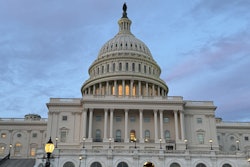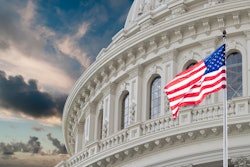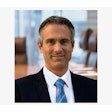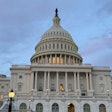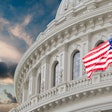In this conversation, recorded live from Washington, I spoke with Greg Chavez, CEO of the Dental Trade Alliance (DTA), about the current state of the dental industry amid significant policy changes.
 Greg Chavez, Dental Trade Alliance CEO.
Greg Chavez, Dental Trade Alliance CEO.
We discussed the DTA's member-driven approach to advocacy, the challenges posed by tariffs and trade policies, and the potential impacts of fluoride and Medicaid cuts on the industry. The conversation highlights the importance of collective action and communication within the dental community to navigate these complex issues.
Podcast transcript
Kevin Henry: Hey, everybody. Welcome back to another edition of "The DrBicuspid.com Podcast." Kevin Henry recording live here at Washington, DC, with the Dental Trade Alliance Washington Policy Summit. And thrilled to be joined by Greg Chavez, the Dental Trade Alliance CEO. How are you?
Greg Chavez: Good? Thanks for joining us, Kevin.
Kevin Henry: So glad to be here. This is such a key time it feels like for dentistry, and I'm so glad DTA put this together.
Greg Chavez: No, it really is. There's never been a time where we're seeing how policy from Washington, DC, is really making an impact on all things within the business sector, and in this case, within the dental industry. So it really is the optimum time to be here, absolutely.
Kevin Henry: So I know from tariffs to fluoride, there's so much that's being discussed right now. How does DTA form its own stance to reflect what its members believe or need
Greg Chavez: So as with any association, we are a member-driven organization. We have a federal affairs committee in place. We also have a regulatory and compliance committee in place. So in this case, it's our federal affairs committee that's really helping to shepherd the position, the shaping of the issues, and the shaping of the positions around the issues; we got to leave lead with a membership. And that's where it all starts, and that's, frankly, where it all begins and ends, is with membership.
Kevin Henry: I know one of the key points that there's been so far has been fluoride, has been very much front of front of mind. Can you just tell me a little bit about what DTA is trying to get done during these few days we're here on Capitol Hill?
Greg Chavez: Yeah. So we actually, within a subset of our federal affairs committee is a fluoride task force that we assembled fairly quickly, and one of the first things that this group did was write a letter to the governor of Utah, expressing the concerns about what the state was doing in terms of removing for it, for the public drinking water. You know, we cite facts and figures from federal sources, from state sources, and it's, it's critical when it comes to, you know, good quality oral health for the patient, the consumer, the citizens of Utah and and it's happening more and more, as we know, with with Florida, right as well. So we'll be doing something similar, you know, with the governor in Florida as well.
Kevin Henry: Knowing it seems like it's state by state right now, could turn into federal, but state by state, is it difficult to keep track of all the moving parts?
Greg Chavez: Kevin, you nailed it. It really is. As things are being decentralized, and fluoride is just one example of, you know, the microcosm of what we should expect for the next several years. As things are decentralized, things are moved to the state, the states, and it's going to become more and more tricky to, you know, keep up with things. And frankly, there's a strong likelihood that different states will have different interpretations of the rules and the ranks. So yes, it's going to be an interesting, interesting time.
Kevin Henry: Let's move on to tariffs, if you don't mind, because I know that that's something that's going to be tackled again today during the meeting where we're at here in DC. What is the view on tariffs, and what it may do? I know it's a moving target as well.
Greg Chavez: It is a moving target. And, you know, do we, you know, like any trade organization, we're built around, you know, the principles of free trade. That's how the supplies, the supply of production has been created is around free trade and around trade within Canada, Mexico, and other country trading partners that are trade partners. This is what we've seen the last several months really has changed quite a bit in the way of trade and trade policy. We ... the change ... that we've never seen before, so there really isn't a playbook here around this. So what are we doing as the trade organization for the dental industry? Thankfully, we have an expert on, who's a partner of ours, Rick Van, who's a regulatory counsel. What's interesting about Rick is he is a trade and compliance law expert, so it's a unique specialty within the legal profession. So we're well equipped to have him on the team, and with having him on the team and the insights as he's bringing forth to the organization, to the members, one on one, to the members, really is insightful and critical.
Kevin Henry: Now more than ever, when you don't have a playbook for something, and then you're facing something that really hasn't been talked about much, how difficult is it to be that leader out there to try to help everybody else understand?
Greg Chavez: This is the role of an association. This is what we do. This is, you know, doing things collectively. This is, this is ... the one of the key purposes of a trade association like DTA. We're just happy we can, you know, bring the companies together, explain the policy shifts, and provide guidance for companies to consider moving forward in terms of their business practices and sourcing options out there.
Kevin Henry: And obviously, you're trying to give guidance to dealers and manufacturers that are then going to give guidance down to their customers as well, so it's really a little bit of a waterfall.
Greg Chavez: It is, and on that, when we first started to hear the you know the groundswell of tariffs -- sweeping tariffs -- we immediately reached out to our allied associations, the American Dental Association, the National Association of Dental Laboratories, and Rick actually authored that letter that was signed by the three groups and sent to the White House. So this is, again, what a trade association has to do in an environment like this.
Kevin Henry: The information you all put together was so handy and appreciate that so much. And one thing that I think maybe is going under the radar a little bit right now is the potential for the Medicaid cuts and what that might mean. I think we're so worried about tariffs and fluoride right now that maybe this is almost under the rader?
Greg Chavez: I believe it was it late last week, I think, the White House delivered a draft budget, and there were some significant changes to cuts to that budget. It's a first draft. We know that there are members of Congress that have concerns on both sides of the aisle. So that's even more reason, you know, for the timing of being here and meeting with the members of Congress and their staffers and giving the perspective the concern of the dental industry about potential Medicaid cuts. It really, you know, is that Medicaid is that last line of defense for people, so it's critical that things maintain
Kevin Henry: There are a lot of us here at this, and we're going to be at Capitol Hill talking to our local representatives and congressmen, which is fantastic. But for those who aren't here, especially the dentists who are listening to this, what's your main message about what to expect and how to work with the dental trade over the next few weeks and months?
Greg Chavez: We, in terms of the dental trade, we represent the supply side of the industry, of the dental industry. Our members, of course, are your vendor partners, and as an association, we work closely with the national ADA, the AGD, all the other specialty dental clinician groups and then the state groups as well. We work hard to afford those partnerships. My message is to continue to lean on your associations and lean on the expertise that the associations bring to the table.
Kevin Henry: Greg, I appreciate it. I know you're extremely busy this extremely busy couple of days here. Thanks for taking a few minutes. I appreciate it.
Greg Chavez: Thanks for having me. Kevin, great to see you.
Kevin Henry: Great to see you as well. Thanks to all of you for listening to this episode of "The DrBicuspid.com Podcast." Absolutely so much going on here in Washington, DC. We're going to keep you apprised on DrBicuspid. So make sure you're checking out DrBicuspid.com, and we are a proud member of the Dental Trade Alliance as well. Until next time, it's Kevin Henry, editor in chief for DrBicuspid, signing off. And as always, wishing you nothing but success ahead.






